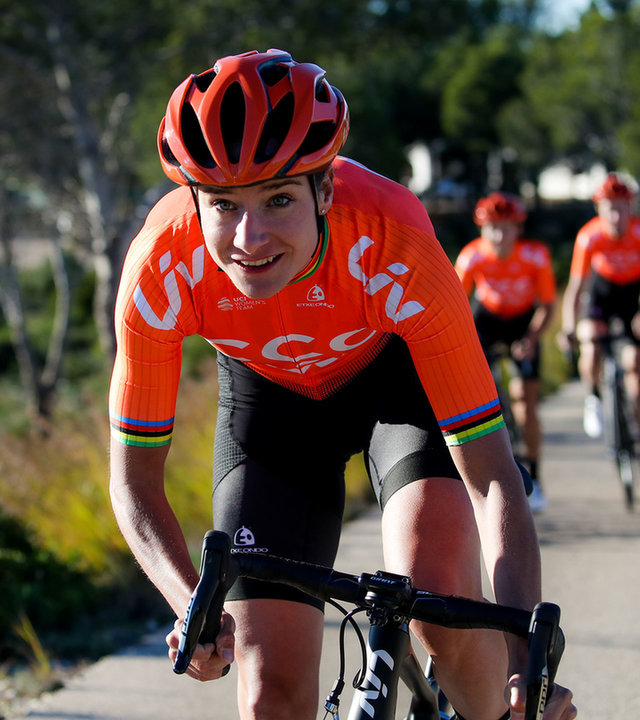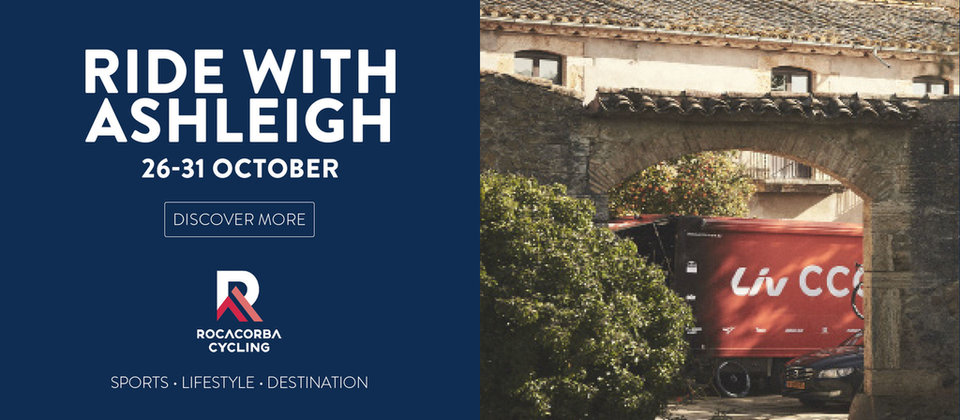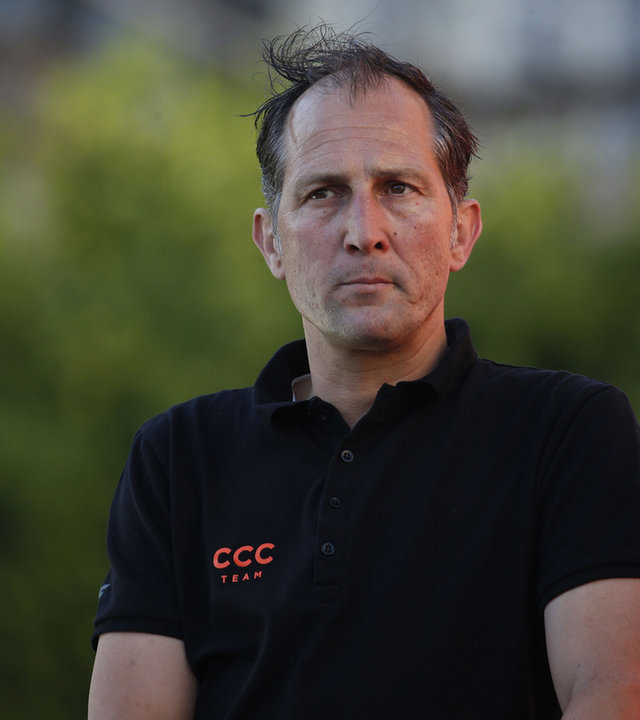
RACING TO WIN
Eric van den Boom
Jeroen Blijlevens
All preconditions for this season to perform with CCC-Liv are present, say sports director Jeroen Blijlevens and team manager and owner Eric van den Boom. The top sport environment has become more professional and the selection has been strengthened. Young talents, future champions and world class riders form a balanced team. “We want to race this season in order to win.”
READ MORE
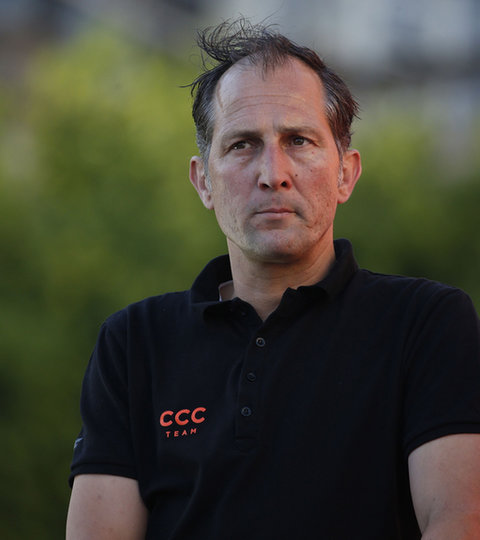
RACING TO WIN
Jeroen Blijlevens
Eric van den Boom
All preconditions for this season to perform with CCC-Liv are present, say sports director Jeroen Blijlevens and team manager and owner Eric van den Boom. The top sport environment has become more professional and the selection has been strengthened. Young talents, future champions and world class riders form a balanced team. “We want to race this season in order to win.”
How Dutch is this team?
Jeroen Blijlevens: “The number of nationalities is comparable to last season. The core is Dutch. But sometimes there is confusion among followers of our sport. We have already been announced as a Polish and American team... The confusion is understandable with a fellow men’s team in the United States and a Polish shoe manufacturer as our head sponsor.”
Eric van den Boom: “We are unchanged Dutch and still independent. The team base and service course have been established in the Netherlands for many years. We also race with a Dutch license. We do have significant, international head sponsors: CCC from Poland and Liv from Taiwan, which we are very happy with. They enable us to compete with the absolute top in cycling.”
Jeroen Blijlevens: “We feel at home and comfortable in orange.”
How did you put the selection together?
Eric van den Boom: “We always try to keep a balanced team, both on a human and an athletic level. Riders must fit in the team. In the discipline itself, there must also be an equilibrium. You have younger riders with development opportunities, you want to move them towards the sub top. At the same time, you have the riders who are strong and powerful enough to support the head woman and occasionally can be the head herself. In addition, there are the head women. For this season it was important to attract a world class rider.”
Jeroen Blijlevens: “I am very happy that Ashleigh Moolman Pasio joined our team. She is of absolute world class. She can participate on many fronts. It does not matter whether we race with her in the Flemish Ardennes or conquer the Monte Zoncolan.”
Eric van den Boom: “We are able to play an even greater role in finals. The chances of success are increasing.”
Jeroen Blijlevens: “The group that ends up in finals is often relatively limited. The same names often kept coming back last year. With Ashleigh and Marianne Vos, we think we have two certainties. Sabrina Stultiens is also very close when she is in shape. In addition, we have riders who are slowly knocking on the door.”
“We have matured in every aspect. There is now a real top sport environment within CCC-Liv”
Will the long-awaited victory in a classic come in 2019 for Ashleigh Moolman Pasio?
Jeroen Blijlevens: “Yes! If you see how complete she is and how strong she is, then it should be possible. She has certainly been very close last year. Why would she not succeed? We won’t get there with an attitude of ‘We’ll wait and see’. We go for it and have faith in our own abilities, whether it’s Ashleigh who wants to win a classic or Evy Kuijpers who wants to join the elite.”
Eric van den Boom: “We do everything we can to win a big victory with her. I think we have created a very good support system in which success can grow. There is now a real top sport environment within CCC-Liv. We have a team that can support her optimally in the races which suit her. So she has plenty of opportunity. Hopefully she will get a big prize. You are obviously also dependent on the opponents.”
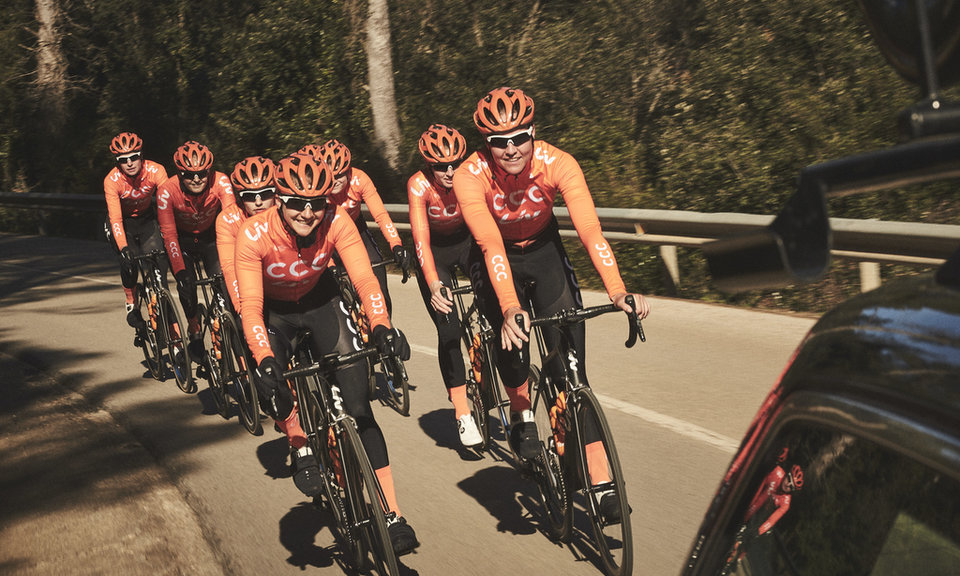
“We do not have a crystal ball, but Jeanne Korevaar has the possibility to break through to the absolute top”
Who has it in her to become the revelation this season?
Jeroen Blijlevens: “That is very difficult to say, because we have only had a few team camps and some preparatory races. The point is that all riders take steps forward. One of the riders with high expectations is Jeanne Korevaar. However, we give her all the time and space she needs in order to work and develop into a top rider. We do not impose any pressure.”
Eric van den Boom: “Jeanne Korevaar is ‘home-grown’ in the team and is doing well. She gets a little better every year. We do not have a crystal ball, but she has the possibility to break through to the absolute top. She will become a permanent figure in the women's peloton in the coming years.”
“It often comes down to common sense in a race, it is not always the strongest who wins”
The team has a big name when it comes to developing talent. What is the trade secret?
Eric van den Boom: “I think we have patience. And I think we guide the riders well. We have the opportunity to offer the right training conditions, all peripheral circumstances make sense. You have to teach riders how to train optimally, what a professional sport life looks like. Our contribution is that we can teach them to read the race. How should you race tactically? Jeroen has an important share in this with all his experience.”
Jeroen Blijlevens: “I let riders reflect on situations in a race. Which scenarios could occur? What do you do at those moments? If the riders themselves have an answer, then I provide my own thoughts. By discussing together, we determine the tactic. What I often notice, is that riders have a romantic perception: they mark their way and see how they prefer to win. But you also have to deal with the competition which is sometimes even stronger. It is also important to analyse the opponents and to be flexible. It often comes down to common sense, it is not always the strongest who wins.”
Eric van den Boom: “Our tactical plans also change in each race, and we do not always play out the same rider. Everyone can come into a winning position, the tactics are adjusted to the situation that takes place. Riders learn how to race in a final. At a certain moment it will work out.”
What should a performance manager add to the team?
Eric van den Boom: “Hidde Bekhuis joined last winter. He is an important additional link in the team. Developments in cycling are going very fast. Not only in terms of technology - equipment, clothing, training tools - but also in training itself. The performance manager is up-to-date and looks at all possible areas for improvement. How can we reduce the frontal surface? How can we produce more power? How can we train more efficiently?”
Jeroen Blijlevens: “The approach to cycling is different in 2019, also in the women’s elite. Science has become more important. We cannot and will not stay behind. In fact, we want to be a frontrunner. All preconditions must be set: equipment, nutrition, training schedules. That also fits with this team, being a very professional, disciplined group. Even at the first training camp, in December, we already worked towards the season. Train, rest, train, rest; that cycle. It is a good basis for building a professional team. That also fits well at CCC-Liv. The riders have to perform, without really putting a lot of pressure on them which often works counterproductive.”
“The Tour of Flanders has always been a phenomenon on the calendar”
When are you pleased at the end of the season?
Jeroen Blijlevens: “When I see that we have worked and performed as a team. One that wins together and loses together. Losing together can also be very nice.”
Eric van den Boom: “At the end of the season we want to look back at a team that participated in the big races. By that I mean: racing in order to win. In addition, I hope that we will make a few nice victories, in stage races and one-day races.”
Jeroen Blijlevens: “We have been successful in the Women's Tour for the last two years, a stage race that suits us. We also want to perform well in the Prudential Ride London with Marianne Vos. In the Amstel Gold Race, we have to use the width of the team. We can also be collectively strong in the Flèche Wallonne and Liège-Bastogne-Liège, but these finals are more difficult and therefore more decisive.”
Eric van den Boom: “The races in Sweden and Norway, in August, are traditional races in which we are successful. The Tour of Flanders has always been a phenomenon on the calendar. I would like to see us doing very well. At the beginning of the season we should not forget the Strade Bianche. That is already a beautiful race in which we stand a chance.”
Polish rising stars in Dutch service
Marta Lach
Agnieszka Skalniak
CCC-Liv is a Dutch team with a Polish head sponsor and Polish riders: Marta Lach and Agnieszka Skalniak. They are known in their own country as great talents who can now show the rest of Europe what they have in store. “We want to pay back the confidence of CCC in our team.”
READ MORE
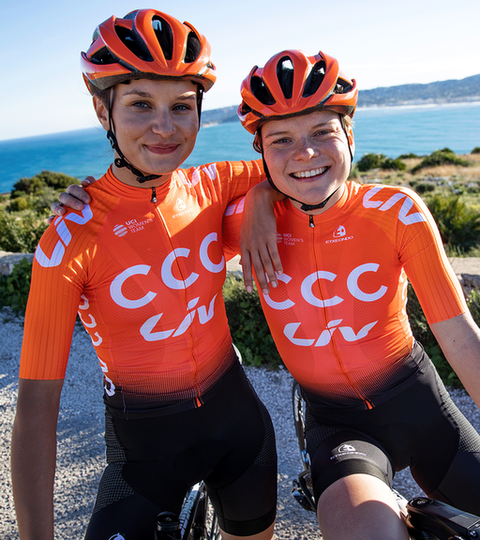
Polish
rising stars in Dutch service
Marta Lach
Agnieszka Skalniak
CCC-Liv is a Dutch team with a Polish head sponsor and Polish riders: Marta Lach and Agnieszka Skalniak. They are known in their own country as great talents who can now show the rest of Europe what they have in store. “We want to pay back the confidence of CCC in our team.”
Did you have a good winter?
Marta: “My winter was one with many training camps. We were in Denia with the team in December. When a large part of the team left for Australia, I first had a camp in Calpe and later in Gran Canaria. After ten days at home, I packed my suitcases for the team internship in Girona. It is the first season that I approach it this way and I must say that I like it. We train together, eat together, do core stability together, and have fun together.”
Agnieszka: “I was in Australia in January. We have been able to ride many many hours. It is the first year that I spend so much time on the bike. Last season, I stayed in Perpignan in the winter for a short period of time, and in Poland for the rest of the season where you are forced to train indoors in the winter. Now, with better training conditions and extra facilities, I hope to progress further.”
“I was angry with Marta, she stayed in my wheel and refused to take the lead”
You are racing together in a team for the first time, have you known each other long?
Marta: “We both come from a mountainous area in southern Poland. There are, however, more than a hundred kilometres between our birthplaces.”
Agnieszka: “I now live in a different part of Poland, where the weather is better. There is less snow in winter, it is comparable to the Netherlands.”
Marta: “We met during the junior years and more and more over time, for example at championships and at training camps with the national selection. But we did not spend much time together. It is different now that we are both riding for CCC-Liv. We call each other on the phone, ‘How are you?’ You can now call it friendship.”
Agnieszka: “It makes sense, we had never been on the same team. And everyone wants to win a race. In our junior years, we were among the top three in Poland and we always fought for the first places. We did not have anything against each other personally, but the battle was on in a race.”
Marta: “I remember an instance in our last year in the junior league. Three of us were ahead and one was dropped, only Agaand I were leading. She rode ahead, she screamed that I had to take over. ‘It's your turn!’ I refused and just stayed in her wheel.”
Agnieszka: “Marta was strong that day. She kept lurking at the right moment and refused to take the lead. I was really angry with her. So angry, that I decided to attack on a steep stretch. I knew I could make the difference there and, luckily I could make a gap. I gave everything and held on. Marta was second.”
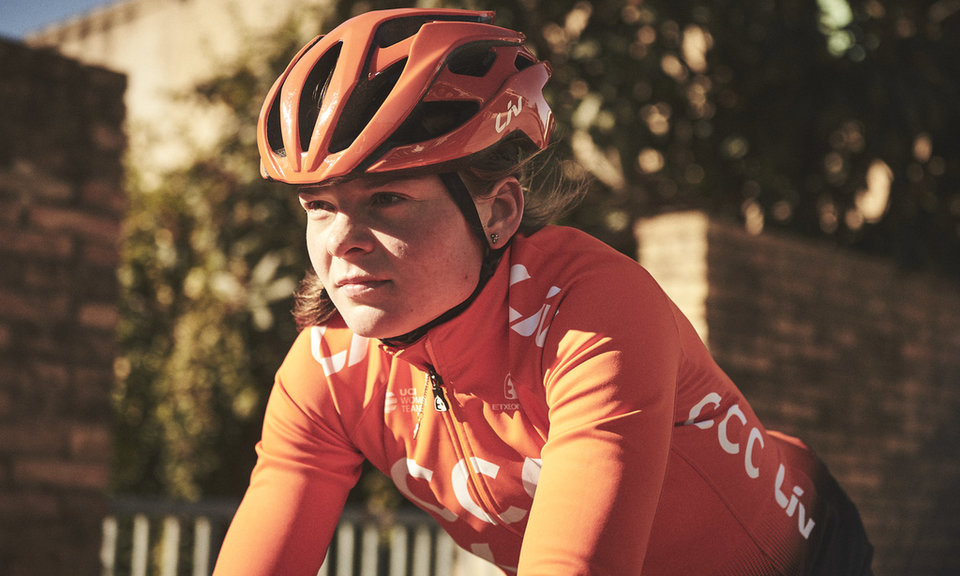
“The orange colour of our team kit is just right: not too dark, not too flashy”
Are you fashion-minded?
Marta: “Girls always want to look good. Our clothing, both in the race and in leisure time, just looks perfect. It is also nice to be able to wear CCC shoes from your own country. The combination of a black bike and a predominantly orange kit is beautiful. The quality is also excellent. The Etxeondo bib shorts, for instance, are made of Dyneema fiber which protects in case of a crash.”
Agnieszka: “When I was in Australia, I often heard people say, including the men’s elite, that we were looking great. The design is simply very beautiful. The orange colour is just right: not too dark, not too flashy. I was happy with all those compliments.”
Marta: “People recognise you on the road because of the jersey. They approach you and worm information out of you.”
Agnieszka: “That sounds familiar. ‘How are you doing in the team?’, ‘You look fit and professional!’ Strangers are approaching you. You have no idea how many questions I have had on social media since my transfer. Everyone in Poland wants a bidon or a signed picture. I have never seen this before. People are really interested.”
Are you staying in Poland during the season?
Marta: “Yes, I stay in Poland. I still study physical education, in Krakow. Normally you study from Monday to Friday, but I cover it in two or three days, depending on what is on the programme. I love being at home, in the south. My family gives me an extraordinary energy. That is also important to perform in cycling. If the weather fails, I can always go to training camp.”
Agnieszka: “I also stay in Poland, where I feel at ease. The culture, the language - it makes things easier. Poland is simply my home.”
“I started slalom skiing and even made it to the level of ski trainer.”
Is it easy to pursue a cycling career as a Polish?
Agnieszka: “It is becoming increasingly common. In my environment, more and more small clubs, teams and training institutes emerge. Young children can go there, and can have room and board. What I like is that several Polish pros and ex-pros support this, also financially.”
Marta: “When we started, it was still different. You had to figure it out on your own. I became excited about the sport after I had participated in a race. At school they said, ‘It's a race, go for it!’ I was hooked and started to progress. I was lucky enough to find the right people at the right moment who could help me to further develop in the discipline.”
Agnieszka: “My mother thought exercising was important, she let me try everything. When I was two years old, I started slalom skiing. I even made it to the level of ski trainer, unfortunately I do not have enough time for that now. I also did ballet dancing for years. Through my parents’ friends I came in touch with cycling. They had a bicycle shop. I participated in a race on the mountain bike and finished first in my age category. That was exactly the motivation that I needed. My parents loved it. Of course they had their parental concerns, but they felt that being outside was important. They really did not want to see me constantly behind a computer.”
Marta: “Same with us. I have five brothers, we were always outside. Now you see children constantly on their smartphones. If I ever have children, I will also teach them how important it is to be outside and to exercise.”
What can we expect from you this season?
Marta: “I like challenging interval races with hills, although they should not be too long. In those races, I hope to be able to support the other riders. I think the classics suit me better than stage races.”
Agnieszka: “The same applies to me, with the difference that I am a bit more skilled in time trials. But wait and see. My current level is higher than ever. I feel that I am stronger than a year ago, especially after the last camp, which feels good.”
Marta: “Every year you become a bit stronger. I want to improve even more this season. Not only physically, but also technically. I also receive a lot of support from the team. How to play it tactically in a smart way? I have also discussed the ideal climbing cadence with Marianne. I look at others and observe. And if something is not entirely clear, then I just ask.”
Agnieszka: “You learn a lot during a race. In Australia I had a lot of support from Riejanne. Our sports director said that we had to take the lead. She gave me very specific instructions about the moment to take the lead and about the pace I had to maintain. Positioning is also crucial. How can I ride in the peloton and be economical with my energy?”
Marta: “This will be my last season in the U23 league. I would like to get another medal at the European Championship, but well, it is still a sport and you have to see how it turns out. Above all, I want to win important races with the team and play a role in the success.”
Agnieszka: “Personally, it is important to book good team results. And I want to do well at the European Championship. This is also my last year in the U23 category. It would be great if I can finish with a medal at the time trial.”
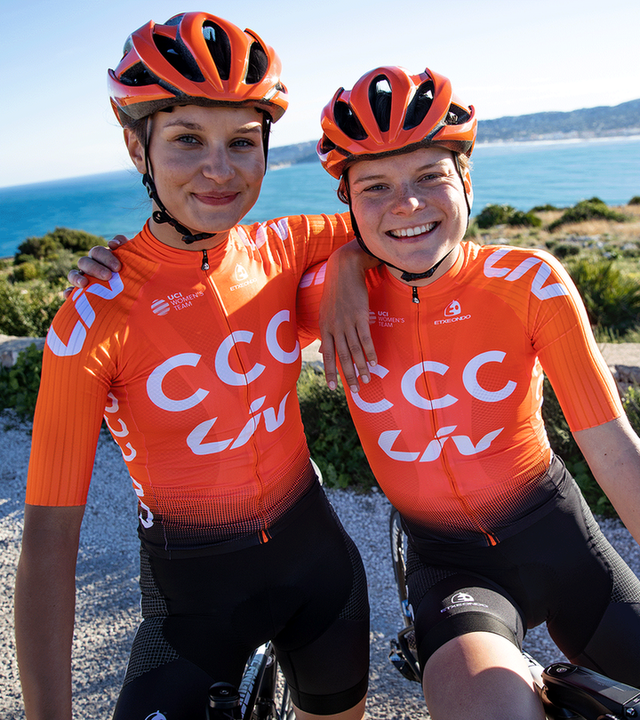
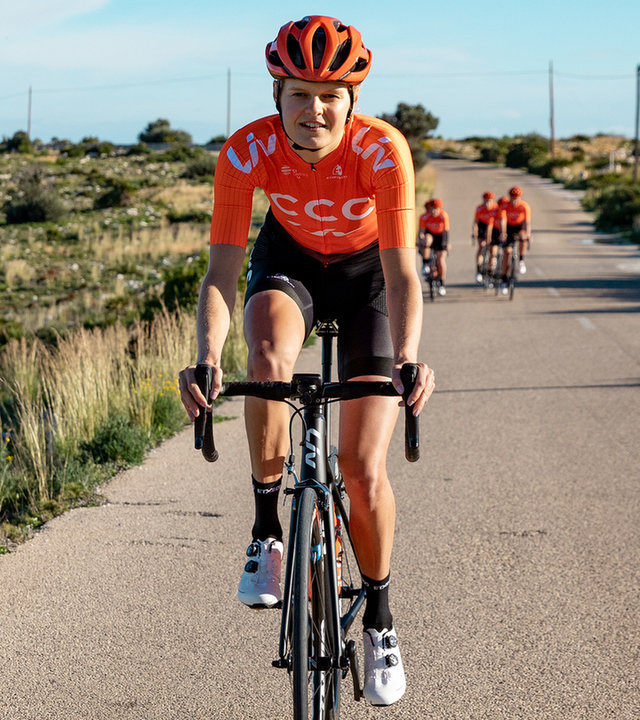
The break-through to the top
Pauliena Rooijakkers
Jeanne Korevaar
Riejanne Markus
Grow, develop, improve. These words are regularly on the lips of Pauliena Rooijakkers, Riejanne Markus and Jeanne Korevaar. They are still relatively young, but they are increasingly sticking their nose to the window. “You notice that we make each other stronger and lift them to a higher level.”
READ MORE
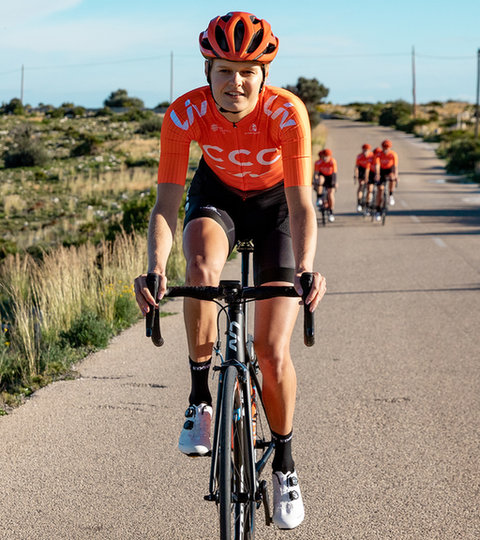
The break-through to the top
Pauliena Rooijakkers
Riejanne Markus
Jeanne Korevaar
Grow, develop, improve. These words are regularly on the lips of Pauliena Rooijakkers, Riejanne Markus and Jeanne Korevaar. They are still relatively young, but they are increasingly sticking their nose to the window. “You notice that we make each other stronger and lift them to a higher level.”
How would you describe the team?
Riejanne: “We are a close team with many young women and loads of talent, combined with a truckload of experience. Marianne and Ashleigh have been performing at an amazing level for many years and have already won plenty. We can learn a lot from them.”
Jeanne: “There is a difference with last year. A few new faces joined the team, resulting in a more international character.”
Pauliena: “What I like is that the team has riders who fit well together.”
Jeanne: “And who are respectful with one another.”
Pauliena: “We’re all team players without any exception.”
Is this a nice period, on the eve of the spring season classics?
Jeanne: “Everyone is wondering these days: am I ready? That is very logical. You have finished the winter months and now it has to happen. But that does not mean that stress takes over. We live as relaxed as possible to the big spring races. There is something in the back of your mind that occasionally says: the real work is coming.”
Riejanne: “Every cyclist gets a kind of panic attack these days: Oh, it's going to start again. Am I good enough? The team keeps us relaxed and Jeroen Blijlevens gives us confidence: "Stick to the feeling with which you ended last year. Try to make small steps every year and continue to progress. I think that's important.”
Jeanne: “It is, of course, nice if you immediately race well in the Omloop Het Nieuwsblad. But that should not influence the rest of the season. Come on, it's the first race. No matter how good or bad you are, the season will last a long time.”
Pauliena: “We have to wait and see, but I think I'm ready. I notice that I rotate more easily than a year ago. I have also done a lot of technique training during the winter which gives me confidence. You have to be positive anyway. From a mental point of view, I am a little stronger again.”
Riejanne: “I raced so much last year that I have a good basis. Last winter I noticed that I was already good on the bike. Then you make a plan with your trainer: how do you work towards the season? I feel fit and feel that it is right.”
“Pauliena can be hard on herself. She keeps going, without complaining”
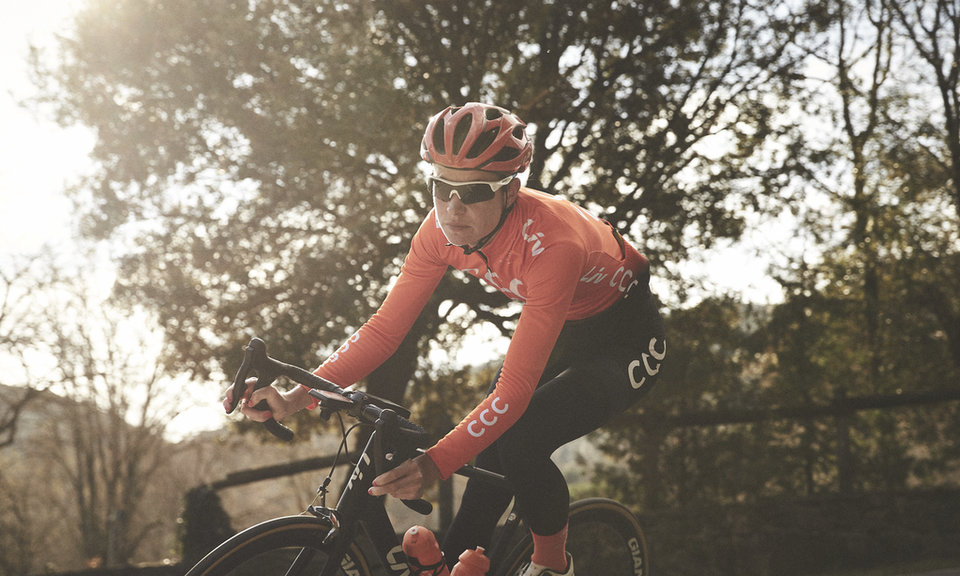
You all progress at an amazing speed. Which preconditions are important in order to do so?
Jeanne: “I like people around me who have faith in me; who help. So basically a good staff. What is really nice here is that the team has that and it clicks. They go through fire for us. Massaging, tactical discussions, material assistance; all these things together ensure that we develop. Of course you have to make it happen yourself. I worked very hard last winter and would like to pick up where I stopped last season.”
Riejanne: “The composition of the group of women is important. It determines the atmosphere and whether you can work well together and learn from each other. You also have the staff and facilities. We were able to do a lot of preparatory work in December, for instance, all the media matters and the physical tests. In the weeks leading to the start of the season, we dotted the i’s and crossed the t’s. Downhill specialist Oscar Saiz visited our training camp in Girona and helped us with downhill and technical training. By paying more attention to detail and by providing these additional facilities, CCC-Liv helps us progress.”
Pauliena: “You clearly notice within this team that we want to make each other stronger. There are a few riders who are capable of much more. They contribute to the fact that you learn a lot. You want to grow towards that. You help each other and want everyone to ride well in races.”
Are you demanding for yourself?
Riejanne: “I think so, that is part of top sports. If you are not demanding, you can never get very far. It is important that you have everything properly done and that you get the best out of yourself.”
Pauliena: “You also have to be able to cope when things don’t go as planned. That's difficult. But you lose more often than you win.”
Jeanne: “I demand a lot from myself. I set the bar high in races as well as during training. I always do what is asked of me. And no less than that. That may not always be positive.”
Do you know each other's strong qualities?
Pauliena: “Riejanne always keeps on fighting, even if things are not going so well. Look at the Giro Rosa, last year. She had bad luck there, fell three times. But she continued to roll up the sleeves and fight. That’s amazing, right?”
Riejanne: “Jeanne is very organised and works methodically. She has exactly in her mind how she wants to do it.”
Jeanne: “Pauliena is really a hard worker, she can be hard on herself. She goes on without complaining. No whining, no holding back.”
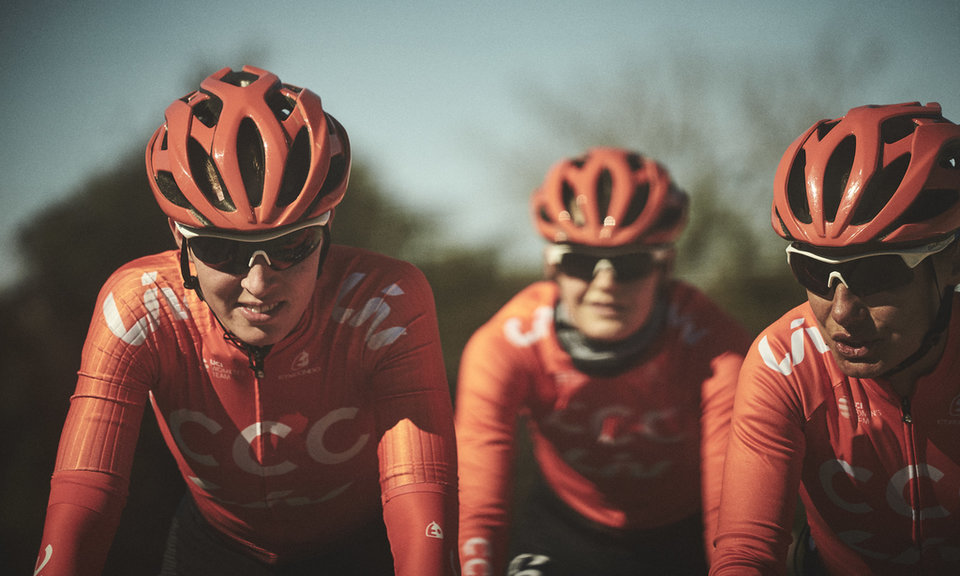
“The Strade Bianche is epic”
Where do you hope to be at the end of the season?
Riejanne: “I hope to do better in some races than last year, to have improved results. The most important thing is that we perform as a team, I want to play a role in that. The strong point of our team is that we have women who are well matched. And there are a few that really stand out. We have to use that to our advantage. If everyone looks at Ashleigh in a race, then another one of us with good legs can break away. That's what happened to me last year in the Amstel Gold Race. It's fun to play that game and it motivates everyone in the team.”
Pauliena: “I had a lot going on last year. With that many race days, I sometimes had a setback. I hope I will have a good, steady season this year and that it will all go a little easier.”
Jeanne: “I want to develop myself, become stronger. I hope to be able to participate in more finals than last year, but I did not mark any specific races. When and how, that really does not matter. We want to ride and race with the team and as a team which will hopefully result in a nice season.”
“We must be able to compete with this team and these riders”
Which is the best spring season race for you?
Riejanne: “The Amstel Gold Race and Strade Bianche! I liked to watch the Amstel Gold Race as a child. Limburg is a fantastic environment for training. I have been there a lot and I know almost all the places. If you are allowed to race on those same roads, that gives a special feeling. There is also many spectators on the side. The Strade Bianche is super, because of the gravel roads and the Tuscan decor. Tuscany is one of my favourite places. The Strade Bianche is epic.”
Jeanne: “The Strade Bianche is also high on my list. The race has so many facets: hills, gravel sections, narrow roads. But the Tour of Flanders must also be mentioned. As for the racing experience, that is quite a madhouse.”
Pauliena: “Give me the Ardennes week, especially Liège-Bastogne-Liège. La Redoute is really an amazing climb. The slopes are slightly longer than in the Amstel Gold Race and Waalse Pijl, which suits me.”
In which spring season classics could the team be most successful?
Riejanne: “In the Ardennes classics. That week will be important for the team. However, these are also tough races to win, as other teams focus just as well and they also have no bad riders in their ranks either. With this team and these women, we must at least be able to compete.”
Jeanne: “Do not forget the Ronde van Drenthe. We should be able to undertake some action with Marianne.”
Pauliena: “The selection has been renewed this year, but we know well what we want and what we can do in certain races. We know each other’s strengths and weaknesses. That will hopefully bring us forward.”
Back on the bike, back to the top
Sabrina Stultiens
The bike of Sabrina Stultiens has been leant against the wall for some time. Training is not an option right now. The cause: a lingering concussion, sustained in the late summer of 2018. Every day, she fights to recover. “I carefully crawl out of the deep. It’s a tough injury, but I know it will be ok and that gives me confidence.”
READ MORE
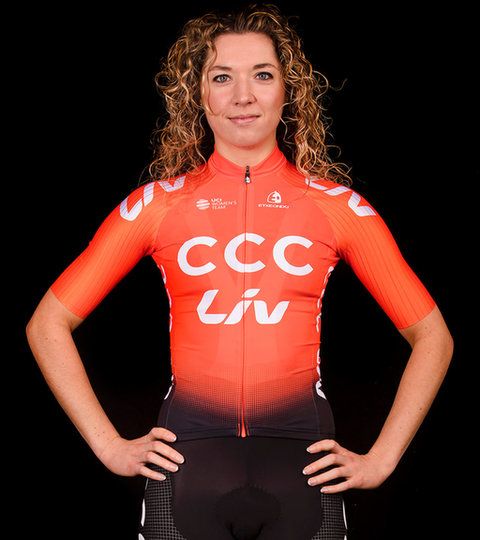
Back on the bike, back to the top
Sabrina Stultiens
The bike of Sabrina Stultiens has been leant against the wall for some time. Training is not an option right now. The cause: a lingering concussion, sustained in the late summer of 2018. Every day, she fights to recover. “I carefully crawl out of the deep. It’s a tough injury, but I know it will be ok and that gives me confidence.”
What happened last year in the Ardèche?
“I was going to race the Tour of the Ardèche with the national selection. On the day prior to the race, we had ridden for an hour. Once back at the campsite, I had an unfortunate fall. I could not hold myself and hit the ground on my chin. It took place before the race even started.”
“I didn’t start, in the first instance, because of the big bulge on my knee”
Had you been treated?
“I was straightaway well supported by the people from the KNWU. My chin needed stitches. I also had a headache, but that was not so bad. I rested a bit and still had the intention to start. The next morning I woke up and there was a bulge as big as an egg on my knee. It was the knee that had been injured before, so for that reason it seemed better not to start.”
You then went home?
“I stayed for another two days. I thought that it might improve and that I could still train a bit. But the headaches had become worse. It was then decided that I should go home. It was a long journey; I noticed that I was very sensitive to stimuli and needed earplugs because the ambient noise was very troubling. I had a dark suspicion of what the real problem was: a concussion.”
“I rode for half an hour, but it felt like a five-hour endurance training”
How was it at home?
“My suspicion was confirmed by the doctor. I had to rest and I slept the first few weeks. I met up with a friend after about three weeks, and got on a bike after nearly five weeks. I rode for half an hour, but felt like I had finished a five-hour endurance training. It did not go well. I was sensitive to light, could not tolerate noise and had severe headaches and concentration problems.”
How did you turn the tide?
“Our team doctor Tessa Backhuijs referred me to a neuropsychologist. I am very grateful to her, because then I could really start working on my recovery. In the beginning of November, I had a first check-up. The analysis was a form of traumatic brain injury. Later in the month we started therapy, two or three times a week in Helmond. There we did small cognitive exercises in which you perform multiple tasks simultaneously. For example, the therapist threw a ball at me and in the meantime I had to name the table of six. At home I had to walk every day, between five and thirty minutes. After a quarter of an hour, I was often completely beat.”
When did you notice any progress?
“In the beginning it was very difficult. I was worried that I would worsen the situation and I even cancelled the therapy, because it was too tiring. After a while, you gain confidence, because you see that you are progressing by taking very small steps. I was less bothered by light, but I still had a lot of trouble with noise and concentration. The tinnitus was also frustrating for a long time.”
“A peculiar injury: it is not noticeable from the outside”
How was it for the people close to you?
“Very challenging! In the afternoon I would lay in bed for hours. I could not have visitors, only my parents and sometimes my grandfather and grandmother. I had to avoid all stimuli and could hardly respond to messages from my best friends. I am still careful. Not so much because I do not feel like it, but because it is too demanding. I do not want to overdo it, as it would be thrown back in my face the next day. You know ... it's just a peculiar injury, it is not noticeable from the outside: I have no abrasion, no scratch, nothing. But inside it is not ok.”
How difficult is it for a top athlete to be patient?
“This is the most difficult injury I have ever had. As a top athlete you compete for the front places by training well. Here it is exactly the other way around: to win this fight, I have to take it easy. In the peloton you sometimes hear: ‘That rider is still out due to a concussion.’ You find it annoying for that particular rider, but do not realise what it means. Meanwhile, I know all about it. I was advised to get in touch with Taco van der Hoorn. He has been in the same situation and he recovered. It is nice to share this with a fellow cyclist.”
“My neuropsychologist always indicates that I can return to my previous form, but that it takes time”
Where are you now?
“I am improving. There is progress, but I am not riding yet. I will soon try again, first on a city bike and later on a race bike. I do not put any pressure on myself and see when that moment comes. I know that you can very easily relapse. Things went well around Christmas, then the therapist thought I might be allowed to ride in January; then I had a fall back. Such moments are intense and tough. That’s why I now take it day to day and I do not think of any races at all. Jeroen Blijlevens and Eric van den Boom are patient. They say: ‘Take all the time that you need!’ It’s nice that they support me which gives me peace of mind.”
Are you going to overcome the concussion?
“I’m convinced of that. It still goes with ups and downs, but the way I feel now is a world of difference compared to how it was. I look at it positively: you learn from every situation, in this case as well, I take the experience and move forward. I now enjoy the things that are going well! You are a rider and hence want nothing more than to be on the bike. My neuropsychologist always indicates that I can return to my previous form, but that it takes time. It is an injury, a very tough and complex one. The fact that it will be alright in the end, gives me the necessary confidence.”
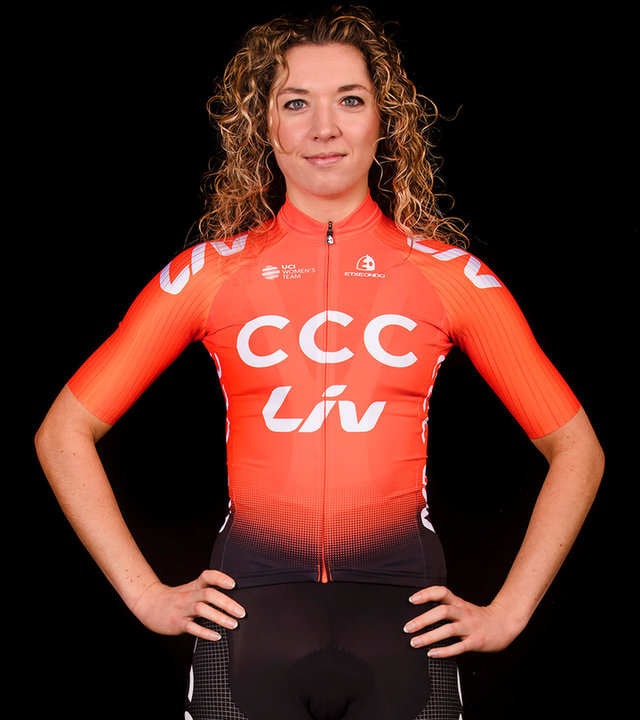
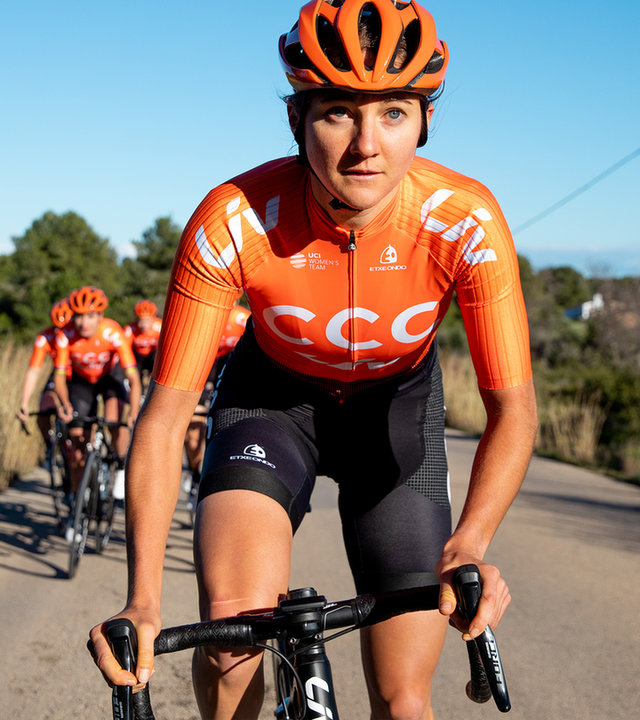
Heroism in the Flemish spring season
Evy Kuijpers
Valerie Demey
Evy Kuijpers was crowned Dutch champion with the elite last year (without contract). Valerie Demey is considered to be one of the major talents of the Flemish cycling school. Both are newcomers to CCC-Liv and focus primarily on success in the spring season classics. “The Flemish cycling culture is unsurpassed.”
READ MORE
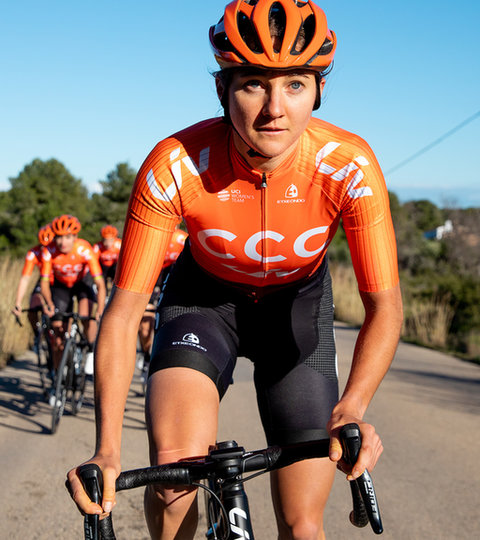
Heroism in the Flemish spring season
Evy Kuijpers
Valerie Demey
Evy Kuijpers was crowned Dutch champion with the elite last year (without contract). Valerie Demey is considered to be one of the major talents of the Flemish cycling school. Both are newcomers to CCC-Liv and focus primarily on success in the spring season classics. “The Flemish cycling culture is unsurpassed.”
Were you quickly accustomed to the new environment?
Valerie: “The professional way in which people interact with us and the opportunities we get are unprecedented. Even now, after two training camps and a trip to Australia, I still have the nice feeling you have when you race with a new, fresh team. This feeling will probably stay for a while. I feel at home here, I want to go for it.”
Evy: “For me, the step was quite big: I came from a club and I was used to a completely different structure. What really appeals to me is the familial, Brabant character of the team. You are immediately included in the group. In Australia we had a super time together. There is also a good click is with the staff. So, already used to? Yes! One gets very quickly used to good things.”
“At CCC-Liv, I experience how much added value a sports director can have”
Who do you learn most from in this phase, from a sports point-of-view?
Valerie: “From every rider, but especially from Marianne Vos and Ashleigh Moolman Pasio. They are world leaders with tons of experience. If we ride side by side during the training and you want to know something, they are always willing to share their knowledge and experience. For instance, how do they approach a training? That is interesting; I always carry my backpack and fill it with everything I can use. I also take away a lot from the staff members.”
Evy: “I’m glad you mention the staff! In the Towards Zero Race Melbourne, we were chanceless on paper. However, Jeroen Blijlevens came up with a tactical plan: we had to split up the peloton in the penultimate lap. Everyone thought: is that even possible? At the very moment, we kept to the plan and five of us were in the final, in a total of fifteen riders. In that race, I have really experienced that a sports director can have a lot of added value. Jeroen handles it in a good way; he involves us and includes us in the discussion. There is always something surprising that comes out.”
Valerie: “What appeals to me is that you go to a race with a plan. I am sure that many riders from other teams start with the idea: we see how it develops. No matter how a race develops, we always have a close team who has been sent out with a tactical plan.”
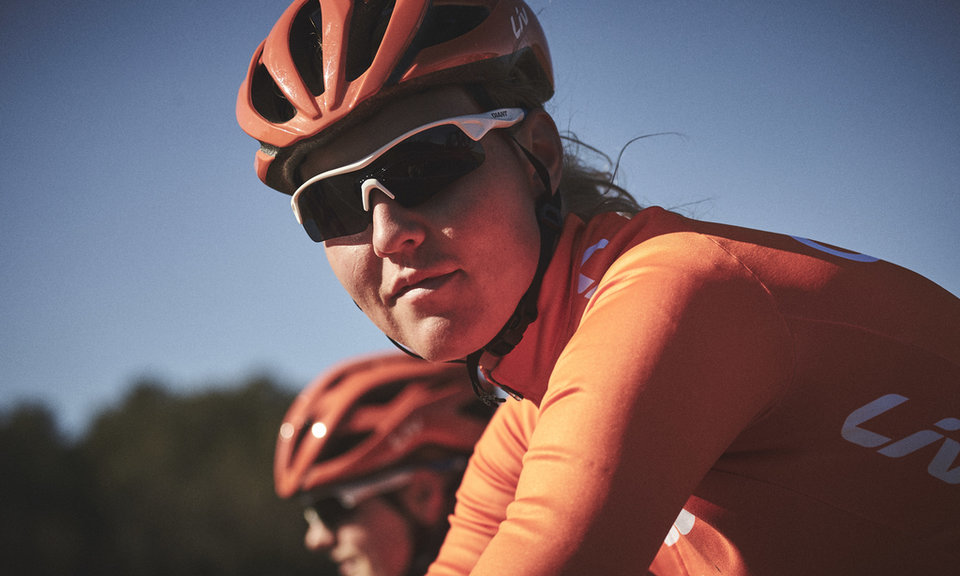
“I dare to sprint against everyone in the team”
What type of races are you suited for?
Evy: “The move to CCC-Liv has been a major step up, there are many races in the World Tour this year. The first priority now is to make a good connection, whereby I need to discover my potential and where I can help the team. The training camps are heavy, the riders are all good climbers. I think I’m the only non-climber. But anyway, I can only improve during a training camp. On the other hand, I dare to sprint against everyone in the team. The way I see it now, the Flemish spring season classics will be most suited for me. I hope to contribute to the success in those races.”
Valerie: “I’m an allrounder. However, last year, it turned out that I was mostly suited for the Flemish classics where power, positioning and wringing are crucial. I like that. I would like to focus in the coming years at races in which I’m good, resulting in more peaks. In the long-run, I should be able to cope in the Amstel Gold Race or Liège-Bastogne-Liège which also became clear from my physical tests. I certainly do not exclude these races.”
Evy: “What you describe, fits very well in women’s cycling. There is a separation between the seasons, riders are specialising more. You cannot be strong everywhere.”
What do you dream of?
Valerie: “Competing in world championships, in the future. Participation is already great, and setting a result would be absolutely fantastic. But that is still far away. This also applies to the Olympic Games. My girlfriend is doing BMXs and she is aiming for a podium place at the Games. Wouldn’t it be great if we could go to Tokyo together? But as a road rider, you do not have everything under control. There is a national coach who makes a selection based on what your performance. I can only make sure that I'm good enough.”
Evy: “I also have a dream, but this one cannot come true. At least, not for now, as the race does not exist yet in our discipline. Competing in Paris-Roubaix seems like the ultimate for me. That classic would suit me well due to the combination of cobbled sectors and flatter roads. Really, I do not think there is anything more beautiful than storming over the cobblestones. Paris-Roubaix is all grandeur, it's old-fashioned cycling. Many races are being controlled via an ear piece, but that does not work. It is an unpredictable race, as bad luck is always lurking.”
“The Dutch say that the Flemish have the most beautiful cycling culture, but they are taking many important prizes”
If we say 7 April 2019, what do you say?
Valerie: “The Tour of Flanders! This race is very close to me, as it is in Flanders. I have to work very, very hard to be outstanding there. My best result was 40thwhich should be better. As you get older, you become stronger and a shorter classification should be possible.”
Evy: “This is the High Mass for Flemish people, the race that stands above all others. The Tour is also 'a serious something' for non-Flemish people. I have completed it once so far and am really crazy about it.”
Valerie: “The Tour has history, something magical. Everyone is anticipating it and takes the day off. The Tour of Flanders’ feeling cannot be put into words. It’s like explaining that a circle is round; it’s just the way it is. It is also very special that you pass by your own training routes on such an important day. That is the case in several races. I come from Bruges, so the Driedaagse Brugge-De Panne also has such a special touch.”
Evy: “It increases your moral, it itches already when training in the Flemish Ardennes. You visualise the races.”
What does the Flemish cycling culture have that the Dutch do not have?
Valerie: “Another involvement of supporters? I do not know exactly ... If you look at the spectators of the Tour, you see many people from all around the world. It is not just the Flemish who support.”
Evy: “In Belgium, cycling is the number one sport. In the Netherlands, many other sports are also important.”
Valerie: “And yet the Netherlands currently have the most successful riders. That's strange. You say: 'Flanders has the cycling culture!' but you are taking many important prizes.”
Evy, laughing: “But we are nothing without the major races. It may be time for our countries to join forces.”
Two world class head women
Marianne Vos
Ashleigh Moolman Pasio
Ashleigh Moolman Pasio and Marianne Vos have been dancing at the top of cycling for years. And they are still far from being done. Ashleigh wants to win a spring season classic after having had some podium places, Marianne dreams of the Strade Bianche and the Amstel Gold Race. “Together we can play the racing game more easily.”
READ MORE
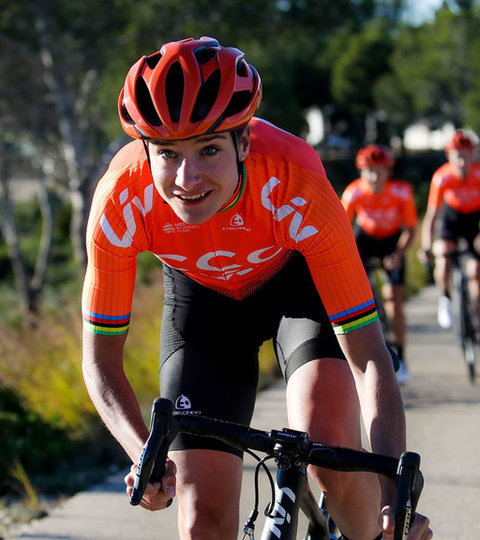
Two world class head women
Ashleigh Moolman Pasio
Marianne Vos
Ashleigh Moolman Pasio and Marianne Vos have been dancing at the top of cycling for years. And they are still far from being done. Ashleigh wants to win a spring season classic after having had some podium places, Marianne dreams of the Strade Bianche and the Amstel Gold Race. “Together we can play the racing game more easily.”
You have already experienced a lot in the cycling world. What makes CCC-Liv special?
Marianne: “Ashleigh is new to the team, she will more quickly notice certain aspects. I’ve been racing in this team all my career. What is perhaps special is the positive way in which talent development and experience go hand in hand. I have seen the team grow, with here and there some adjustments in order to further improve. We strive for the highest possible level with an ambitious group.”
Ashleigh: “I was very easily embraced by this team. It feels like I have been a part of it for a long time. There is a friendly atmosphere, but if it has to be serious, that happens as well. The set-up is professional, which I feel comfortable with. I also like the combination of young and experienced riders. It is nice to transfer my experience. Although it sometimes feels quite strange to be seen as an experienced rider as I have only been in this sport for about ten years. I never went through the junior and U23 categories. I consider it as a compliment. It indicates that I have learned a lot in a short time. And I am still learning. In a new team with other people, I can also continue to develop myself.”
“I do not mind if I or one of my teammates wins in orange”
Which sporting memories do you have of each other?
Ashleigh: “To get to where I am now, I had to learn the trade from others rather quickly. Fortunately, I got to know Marianne at an early age when she once had a training camp with the Dutch selection in South Africa. Later, in races, I have always observed her. She is a complete rider, so you follow her because you can learn a lot from her. She is technically skilled and can read the course like no other. Races such as the Giro Rosa and the World Championships in Limburg have always stayed in my memory. On the Cauberg, in 2012, Marianne was extremely impressive. I was twelfth there.”
Marianne: “Of course I remember our first meeting at the training camp in South Africa. I read in an article what it meant to you to be able to train with us. But I also remember that we were happy that you were there. At that time we were the best riders in the Netherlands and trained with the best in South Africa. That was special for us.”
Ashleigh: “You treated me as an equal, but I was nervous among all those Dutch top riders.”
Marianne: “I did a few races there. It was November, there was no pressure because the road season was pretty much over. It sometimes felt like a holiday and sometimes like an early training camp. You had to proof yourself as South African. That approach was slightly different. I remember that we ended up in Pretoria in traffic, you said: ‘Let me take the lead here, because safety first’. You guided us through the traffic and past the traffic lights. Amazing!”
What can you learn from each other?
Ashleigh: “Marianne is complete and strong, and has good technique. Above all, she races a lot on instinct. That is different from me. It is much more in my nature to think about situations and possible scenarios. I am naturally also much focused on numbers. I prefer to keep control over everything. I like to think a few steps ahead: what could happen in situation X or Y? That is partly due to my previous study in chemistry, I think. This can be a strength, but also a weakness. At times you just have to switch quickly. I have to start racing more instinctively and making the right choices in the moment. That is something you learn from someone with a lot of experience.”
Marianne: “For me it is exactly the opposite. Your strength is to work in a structured way, you already have the scenarios in your head. I often go somewhere without a plan, and follow my feelings. Sometimes it might be better to have considered certain developments in advance. Because in a race, you have to communicate and know what you are going to do, especially if more team riders are in the front. A structured approach can help.”
Ashleigh: “But too structured is not good either. In the beginning I was very diligent. I always wanted to do everything to the fullest. I did all the programmes that were set. Always wanted to reach the allocated training values. That has changed somewhat over the years. The one with the best numbers does not always win the race, you have to race in a clever and efficient way. In the beginning, for example, I always raced forward through the wind. You may also have to be flexible in training sessions. Sports scientists and trainers can work out such beautiful schemes, but we are above all people. If a training ride with an X-number of intervals is on the programme and your body says it cannot be done, you have to listen to it.”
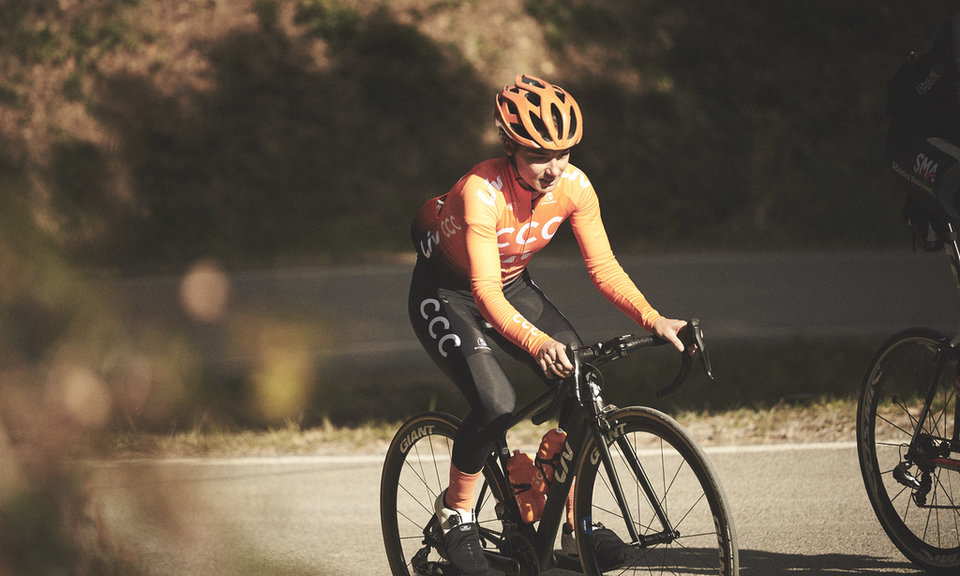
“I have been performing very consistently over the years and finish regularly on the podium, but a big one is still missing on my honours list.”
Is it nice to race with more head women?
Marianne: “That is certainly true. Riders are getting stronger, teams are getting stronger, the peloton is getting stronger. You need a whole team to be able to participate with more than one in the final. If you are in the lead with strong teammates, you can play different cards and you have a better chance. In case you are isolated, then it is rather difficult. You cannot react to everything and then still win, although you can, of course, have a lucky shot. You are forced to make choices.”
Ashleigh: “I look forward to being one of the head women and especially to be part of a successful team. Whoever wins does not matter. It’s nice if you’re strong, but it’s equally nice if not everyone just leans on you. It also helps that Marianne and I have different qualities. We can use that.”
Marianne: “Our qualities partly overlap, but each of us also has other strengths, so we complement each other. It becomes more difficult for other teams if you can choose different strategies. If the competition focuses on one rider, the other can benefit. It may sound crazy what I’m saying now (because I really like to win), but I do not mind if I or one of my teammates wins in orange; or that one rider in the white South African champion jersey of course. It feels the same for me. I get my satisfaction from the teamwork in the race.”
“In Australia, it became clear to me that we will hear a lot from Jeanne in the future”
Do you feel pressure?
Ashleigh: “You always have certain objectives that you strive for, accompanied by a certain level of pressure. This is positive as it goes hand in hand with the focus that you have. Marianne wants to win races and that is just as good for me. I have been performing very consistently over the years and finish regularly on the podium, but a big one is still missing on my honours list. I would like to win an important race this season.”
Marianne: “It would be very nice if you succeed. I would be happy to support you in making this possible.”
Ashleigh: “There is one race that I really like to put on my list: the Flèche Wallonne! This is special to me because of the amazing vibe, the supporters and the iconic finish on the Wall in Huy. We do not have many races in our discipline with a finish line at a summit. I have already been on the podium twice and ended up in the top ten six times. The victory was very close last year and it just did not work out. It would be great if I could draw the longer straw once. Also the overall victory in the Giro Rosa would be great. Last year I also ended in second place there.”
Marianne: “I also have a race in which I want to perform well, and it is being held soon: the Strade Bianche. As soon as there were rumours that this race would be on our calendar, I thought it would be great to ride it. The race is fantastic, as is the uphill finish in Siena, one of the most beautiful cities in the world. The Amstel Gold Race is also special. It is the biggest classic that we have in the Netherlands and the course suits me well. I’m also aiming for the championships this season.”
Who in this group can make it the absolute top?
Ashleigh: “I think Jeanne has the talent to get far. When it was certain that I would go to CCC-Liv, I followed the team even more. I noticed that she was successful in the Lotto Belgium Tour. She has tasted what it is to win. In January we rode together in Australia and it became clear to me that we will hear a lot from Jeanne in the future. She is in a good environment where she can quietly work towards a breakthrough.”
Marianne: “You always see Jeanne improve. She is an important link within the team, something that is not always seen by the outside world. It is difficult to explain how crucial the preparatory work of teammates is. Jeanne is a 100 percent team player. She is always there when the work has to be done. That also helps her to improve her level. Hopefully she can also get herself in the position to win.”

